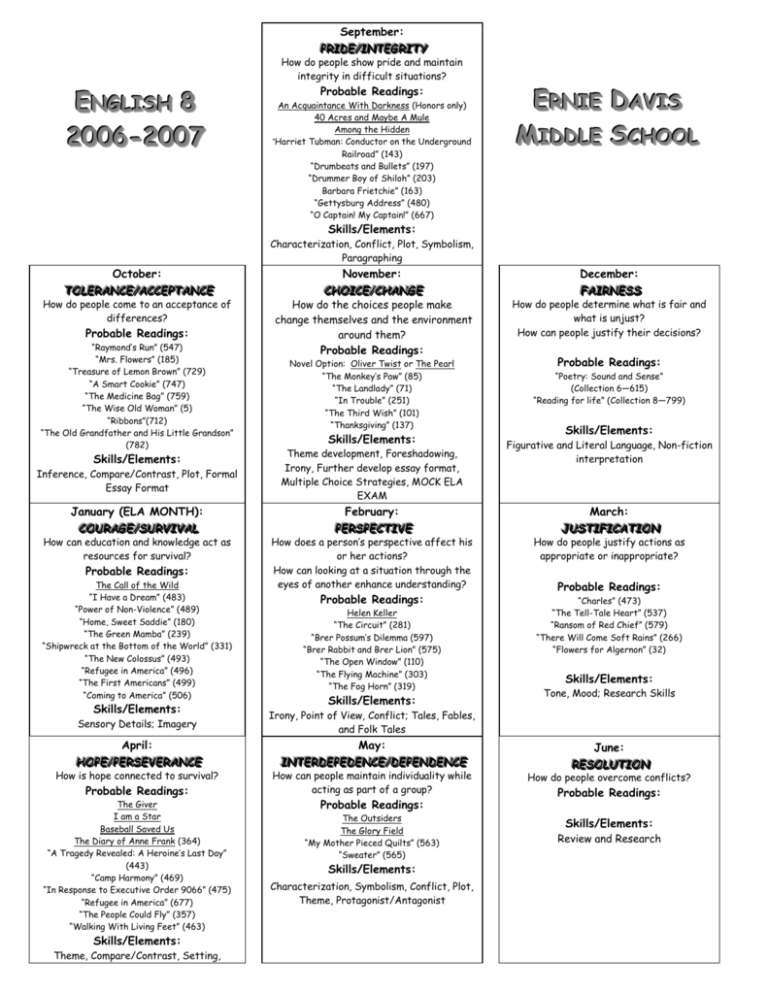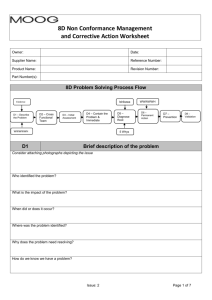the File
advertisement

September: PPPR R D E N T E G R T Y RIIID DE E///IIIN NT TE EG GR RIIIT TY Y EN NG GLLIIS SH H8 2006-2007 How do people show pride and maintain integrity in difficult situations? Probable Readings: An Acquaintance With Darkness (Honors only) 40 Acres and Maybe A Mule Among the Hidden “Harriet Tubman: Conductor on the Underground Railroad” (143) “Drumbeats and Bullets” (197) “Drummer Boy of Shiloh” (203) Barbara Frietchie” (163) “Gettysburg Address” (480) “O Captain! My Captain!” (667) ERRN NIIE E DA AV VIIS S MIIDDDDLLEE SCCH HO OO OLL Skills/Elements: Characterization, Conflict, Plot, Symbolism, Paragraphing October: T O L E R A N T O L E R A N C E A C C E T A N C E TOLERANC CE E///A AC CC CE EPPPT TA AN NC CE E How do people come to an acceptance of differences? Probable Readings: “Raymond’s Run” (547) “Mrs. Flowers” (185) “Treasure of Lemon Brown” (729) “A Smart Cookie” (747) “The Medicine Bag” (759) “The Wise Old Woman” (5) “Ribbons”(712) “The Old Grandfather and His Little Grandson” (782) Skills/Elements: Inference, Compare/Contrast, Plot, Formal Essay Format January (ELA MONTH): C C O U R A G E S U R V V A CO OU UR RA AG GE E///S SU UR RV VIIIV VA ALLL How can education and knowledge act as resources for survival? Probable Readings: The Call of the Wild “I Have a Dream” (483) “Power of Non-Violence” (489) “Home, Sweet Saddie” (180) “The Green Mamba” (239) “Shipwreck at the Bottom of the World” (331) “The New Colossus” (493) “Refugee in America” (496) “The First Americans” (499) “Coming to America” (506) Skills/Elements: November: C H O C H O C E C H A N G E CHOIIIC CE E///C CH HA AN NG GE E How do the choices people make change themselves and the environment around them? Probable Readings: Novel Option: Oliver Twist or The Pearl “The Monkey’s Paw” (85) “The Landlady” (71) “In Trouble” (251) “The Third Wish” (101) “Thanksgiving” (137) Skills/Elements: Theme development, Foreshadowing, Irony, Further develop essay format, Multiple Choice Strategies, MOCK ELA EXAM February: PPPE E R S E C T V E ER RS SPPPE EC CT TIIIV VE E Skills/Elements: March: J U S T J F C A T O N JU US ST TIIIF FIIIC CA AT TIIIO ON N “Charles” (473) “The Tell-Tale Heart” (537) “Ransom of Red Chief” (579) “There Will Come Soft Rains” (266) “Flowers for Algernon” (32) Helen Keller “The Circuit” (281) “Brer Possum’s Dilemma (597) “Brer Rabbit and Brer Lion” (575) “The Open Window” (110) “The Flying Machine” (303) “The Fog Horn” (319) Skills/Elements: May: IIIN N T E R D E E D E N C E D E E N D E N C E NT TE ER RD DE EPPPE ED DE EN NC CE E///D DE EPPPE EN ND DE EN NC CE E Theme, Compare/Contrast, Setting, Skills/Elements: Figurative and Literal Language, Non-fiction interpretation Probable Readings: April: H H O E E R S E V E R A N C E HO OPPPE E///PPPE ER RS SE EV VE ER RA AN NC CE E The Giver I am a Star Baseball Saved Us The Diary of Anne Frank (364) “A Tragedy Revealed: A Heroine’s Last Day” (443) “Camp Harmony” (469) “In Response to Executive Order 9066” (475) “Refugee in America” (677) “The People Could Fly” (357) “Walking With Living Feet” (463) Probable Readings: “Poetry: Sound and Sense” (Collection 6—615) “Reading for life” (Collection 8—799) How do people justify actions as appropriate or inappropriate? Sensory Details; Imagery Probable Readings: How do people determine what is fair and what is unjust? How can people justify their decisions? How does a person’s perspective affect his or her actions? How can looking at a situation through the eyes of another enhance understanding? Irony, Point of View, Conflict; Tales, Fables, and Folk Tales How is hope connected to survival? December: F F A R N E S S FA AIIIR RN NE ES SS S How can people maintain individuality while acting as part of a group? Probable Readings: The Outsiders The Glory Field “My Mother Pieced Quilts” (563) “Sweater” (565) Skills/Elements: Characterization, Symbolism, Conflict, Plot, Theme, Protagonist/Antagonist Probable Readings: Skills/Elements: Tone, Mood; Research Skills June: R E S O R U T O N RE ES SO OLLLU UT TIIIO ON N How do people overcome conflicts? Probable Readings: Skills/Elements: Review and Research Mrs. Woolever’s Grading Policy Homework assignments count 1x. The lowest homework grade is dropped. Homework may be turned in late, but the maximum grade given is 85. Quizzes and in class assignments count 1x. Unit Exams count 3x. Writing assignments count AT LEAST 3x. Weight may vary based on the number of components involved and the amount of time we spend on it. Class Projects count AT LEAST 3x (again, depending on components and time involved), and Notebook check counts 3X. EACH OF THE ABOVE COMPONENTS ARE APPROXIMATELY 20% OF THE AVOERALL CLASS AVERAGE.






